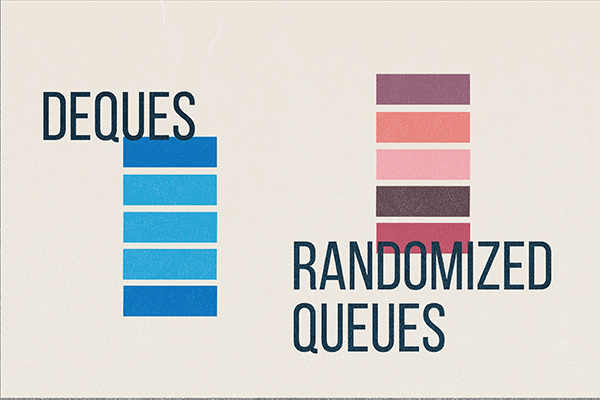 Queues
Queues
Read about the code style principles. From this assignment on, you should follow the code style principles detailed in this page. Read it carefully or you might lose points in grading.
Write a generic data type for a deque and a randomized queue. The goal of this assignment is to implement fundamental collections using resizing arrays and linked lists, and to introduce you to generics and iterators.
Dequeue.
A double-ended queue or deque (pronounced “deck”)
is a generalization of a
stack and a queue that supports adding and removing items
from either the front or the back of the collection.
Create a generic data type Deque that implements the following API:
public class Deque<Item> implements Iterable<Item> {
// construct an empty deque
public Deque()
// is the deque empty?
public boolean isEmpty()
// return the number of items on the deque
public int size()
// add the item to the front
public void addFirst(Item item)
// add the item to the back
public void addLast(Item item)
// remove and return the item from the front
public Item removeFirst()
// remove and return the item from the back
public Item removeLast()
// return an iterator over items in order from front to back
public Iterator<Item> iterator()
// unit testing (required)
public static void main(String[] args)
}
Corner cases. Throw the specified exception for the following corner cases:
IllegalArgumentException
if the client calls either addFirst() or addLast()
with a null argument.
java.util.NoSuchElementException
if the client calls either removeFirst() or removeLast
when the deque is empty.
java.util.NoSuchElementException if the client calls the next()
method in the iterator when there are no more items to return.
Unit testing. Your main() method should
implement the following tests:
addFirst(), and then remove them all
using removeLast(). Verify that the output of the
removals is the numbers 1 through 10 (in this order), e.g., by printing "Error" to
the standard output if you find a discrepancy.addLast() and removeFirst().
addFirst(). Use a foreach loop to
print the contents of the deque. Verify that the output is the
number 10 through 1 (in this order).Note that the unit tests won't be graded by the tigerfile autograder, they will be manually graded. So you don't have to follow any specific format, but you also won't get automatic feedback on it when you click on "Check Submitted Files".
Performance requirements. Your implementation must achieve the following worst-case performance requirements:
Randomized queue.
A randomized queue is similar to a stack or queue, except that
the item removed is chosen uniformly at random among items in
the collection.
Create a generic data type RandomizedQueue
that implements the following API:
public class RandomizedQueue<Item> implements Iterable<Item> {
// construct an empty randomized queue
public RandomizedQueue()
// is the randomized queue empty?
public boolean isEmpty()
// return the number of items on the randomized queue
public int size()
// add the item
public void enqueue(Item item)
// remove and return a random item
public Item dequeue()
// return a random item (but do not remove it)
public Item sample()
// return an independent iterator over items in random order
public Iterator<Item> iterator()
// unit testing (optional)
public static void main(String[] args)
}
Iterator. Each iterator must return the items in uniformly random order. The order of two or more iterators to the same randomized queue must be mutually independent; each iterator must maintain its own random order.
Corner cases. Throw the specified exception for the following corner cases:
IllegalArgumentException if the client calls
enqueue() with a null argument.
java.util.NoSuchElementException
if the client calls either sample() or
dequeue() when the randomized queue is empty.
java.util.NoSuchElementException if the client calls the next()
method in the iterator when there are no more items to return.
Unit testing. You don't need to create unit tests for the randomized queue.
Performance requirements. Your implementation must achieve the following worst-case performance requirements:
next() and hasNext() operations must
take constant time.
Client.
Write a client program Permutation.java that takes an integer k as
a command-line argument; reads a sequence of strings from standard input
using StdIn.readString(); and prints exactly k of them,
uniformly at random.
Print each item from the sequence at most once.
Your program must implement the following API:
public class Permutation {
public static void main(String[] args)
}
Command-line argument. You may assume that 0 ≤ k ≤ n, where n is the number of string on standard input. Note that you are not given n.
Performance requirements. Your implementation must achieve the following worst-case performance requirements:
Permutation must be must be linear in the size of the input.
Deque or RandomizedQueue object with at most n items.
Deque or RandomizedQueue object with at most k items.
Submission.
Submit the programs RandomizedQueue.java, Deque.java, and
Permutation.java.
Your submission may not call library functions except those in
StdIn,
StdOut,
StdRandom,
java.lang,
java.util.Iterator,
and
java.util.NoSuchElementException.
In particular, do not use either
java.util.LinkedList
or
java.util.ArrayList.
Finally, submit readme.txt
and acknowledgments.txt
files and answer the questions.
Grading.
file points Deque.java18 RandomizedQueue.java15 Permutation.java5 readme.txt2 40
Reminder: You can lose up to 4 points for breaking style principles and up to 3 points for not implementing the deque unit tests.
Extra credit: You can earn 2 points of extra credit for conserving memory in
Permutation.java (see performance requirements section above).